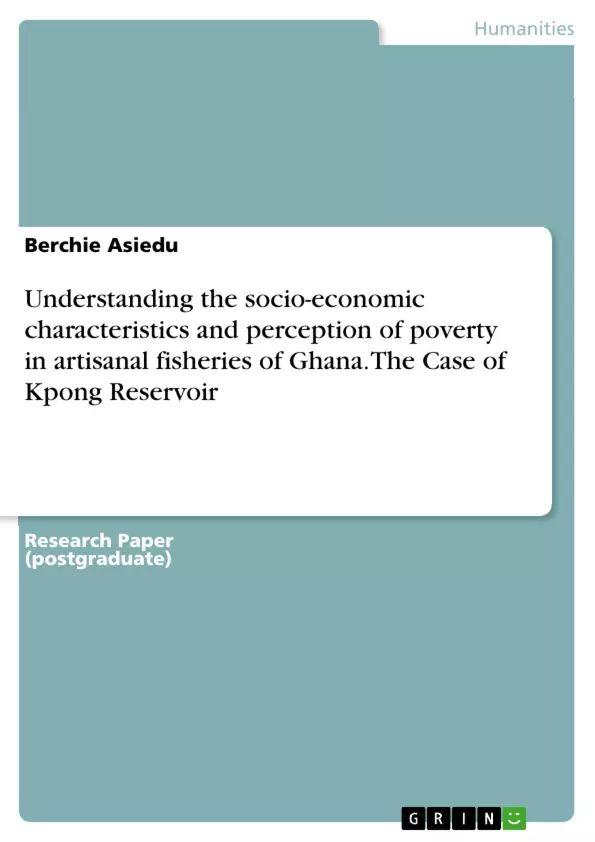There is a worldwide perception that large number of small-scale fishers, especially in Africa, live in poverty. We applied a mixed-methods of interview, catch assessment and observation to understand the socio-economic characteristics and perception of poverty in artisanal fisheries of Kpong Reservoir of Ghana. Specifically, we asked the following questions: What are the socio-economic characteristics of the fishing communities in terms of age, education, household sizes and fishing experience? What is the distribution of fishing costs and household expenses? What is the perception of poverty in terms of understanding, nature and causes? Results of the study show that the socio-economic characteristics of the fishers around the reservoir are quite similar.
However, they differ in terms of income and household expenditures. Dominant gears used consist of purse seine and gill nets. This study also revealed that fishers have an in-depth perception and knowledge about poverty in the fishing communities; and that it is multi-dimensional in nature other than soley from lack of income. From the study, fishers were able to identify the most vulnerable groups to poverty in the communities.
Keywords: socio-economics; small-scale fisheries; poverty; reservoir; Kpong
Inhaltsverzeichnis (Table of Contents)
- Abstract
- Introduction
- Study area
- Kpong
- Small London
- Methods
- Data collection and analysis
- Data collection interviews
- Data collection catch assessment
- Data collection observation
- Data collection and analysis
- Results and Discussions
- Socio-economic characteristics
- Fishing activities
- Catch assessment
- Household expenditure
- Income
- Distribution of fishing costs
- Perception, understanding and causes of poverty
- Conclussion
- Acknowledgement
- References
Zielsetzung und Themenschwerpunkte (Objectives and Key Themes)
This study aims to explore the socio-economic characteristics and perceptions of poverty among artisanal fishers in the Kpong Reservoir of Ghana. The study specifically investigates the socio-economic background of the fishers, the distribution of fishing costs and household expenses, and the fishers' understanding, nature and causes of poverty.
- Socio-economic characteristics of artisanal fishers in the Kpong Reservoir
- Fishing activities and gear usage in the reservoir
- Perception of poverty among the fishing community
- Causes and understanding of poverty in the fishing communities
- The multi-dimensional nature of poverty beyond income
Zusammenfassung der Kapitel (Chapter Summaries)
- Introduction: This chapter introduces the global context of small-scale fisheries and their importance to food security and livelihoods, especially in Africa. It highlights the research objectives of understanding the socio-economic characteristics and perception of poverty among artisanal fishers in the Kpong Reservoir, Ghana.
- Study area: This chapter provides detailed information about the Kpong Reservoir, its location, and its significance as a man-made lake and hydroelectric dam in Ghana. It also discusses the economic and social importance of the reservoir, highlighting its role in the country's power production, fish protein supply, and transportation.
- Methods: This chapter outlines the research methodology used in the study, including data collection techniques such as interviews, catch assessments, and observations. It provides a brief overview of the data collection procedures and analysis methods employed.
- Results and Discussions: This section will delve into the findings of the study, analyzing the socio-economic characteristics of the fishers, their fishing activities, catch assessments, household expenditures, income distribution, and perceptions of poverty.
Schlüsselwörter (Keywords)
The study focuses on the socio-economic conditions and perception of poverty in artisanal fisheries, particularly in the Kpong Reservoir of Ghana. Key themes include socio-economics, small-scale fisheries, poverty, reservoir, and Kpong. The research explores the multi-dimensional nature of poverty in fishing communities and aims to provide insights for social and poverty intervention policies and programs.
Frequently Asked Questions
What is the focus of the study on the Kpong Reservoir?
The study investigates the socio-economic characteristics and the perception of poverty among artisanal fishers living around the Kpong Reservoir in Ghana.
What are the main socio-economic factors examined?
The research looks at age, education levels, household sizes, fishing experience, income distribution, and household expenditures of the fishing communities.
How do fishers in Kpong perceive poverty?
Fishers view poverty as a multi-dimensional issue that goes beyond just a lack of income, identifying various social and environmental causes.
What types of fishing gear are dominant in the reservoir?
The study found that purse seine and gill nets are the most commonly used gears among the artisanal fishers in the area.
Who are the most vulnerable groups in these fishing communities?
The research enabled fishers to identify specific groups within their communities that are most susceptible to falling into poverty.
- Citation du texte
- Berchie Asiedu (Auteur), 2011, Understanding the socio-economic characteristics and perception of poverty in artisanal fisheries of Ghana. The Case of Kpong Reservoir, Munich, GRIN Verlag, https://www.grin.com/document/165448



